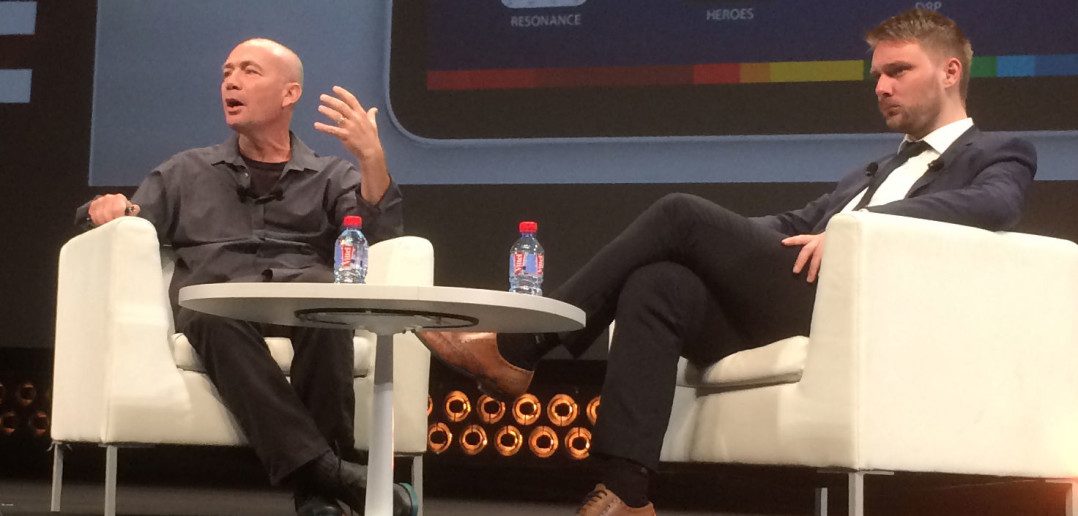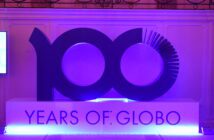It would be hard to find a sparkier keynote speaker than Avi Nir, CEO of Israel’s Keshet Media Group. The company behind Prisoners of War – the show which became Homeland – as well as buzzy talent show Rising Star is on a roll in 2014. Its boss had plenty of views to share with the MIPTV audience in an interview conducted by Peter White, international editor for Broadcast magazine.
Nir said he was a reluctant attendee, preferring to « concentrate on content, not market » before being persuaded by colleagues that he should come to Cannes. He was pleased to have been argued round.
« Keshet is on the one hand small, very small in comparison to the big production companies and broadcasters in the world, but there’s something hopefully in there: there is great motivation, there is talent, and our aim, out goal, is to look and see whether this can travel around the world, » he said.
« I think our journey really began when we thought hard about who the hell we are. It’s a question of identity. The answer was… we are a business organisation, but we’re not. We are – and I think this is the advantage or the importance of being small – we are not in the business of business. We are in the business of television. The drive is to make great television, the drive is to make great content. And when you realise this, this is the real deal. This is the motor of the company. It’s not saying we’re not after the ratings, it’s not saying we’re not after the money. We are. But the core of our business, the essence, is about the content and the creation. »
Nir claimed that bigger companies can end up more worried about their financials than a smaller player like Keshet, which is focusing hard on creating a culture that « allows creative people to flourish ». Do Keshet’s shareholders agree? Yes, according to Nir. « I feel that the Keshet management are the kids left at home and told ‘do your best’. And we are doing our best! The essence of what we are doing is to play. We like the things we do. »
Nir added that Keshet tries to think like the « third or fourth player » in the market, even when its shows are getting great ratings. « Disruptiveness cannot come if you’re complacent, if you feel like the winner, » he said.
Keshet first came to global prominence with Prisoners of War, the show that was eventually remade as Homeland. « This is the most Israeli story you could think of. I don’t think there is a more local story than Hatufim… The story was so strong. We don’t know how to make procedurals, and frankly speaking we are not interested in procedurals. We are looking for stories that will be a TV novel, » he said.
« In this day and age, the viewer is accustomed to many many formulas. You cannot really disrupt the viewer, you cannot really grab his attention using formulas. So when you get, or you feel – it’s in your guts – a story that is totally out of the box, you are there, and you feel it, and this will immediately transform to the viewer. So we are looking for these kinds of stories which will be very original, very disruptive. »
He continued: « We are all in the TV business somewhat not really facing the challenges of the viewers. I think the digital age is not only about technology. It’s not about that. I think the digital viewer, I call it the digital state of mind… It means the viewer has many alternatives, he is very tech-savvy, he knows all the formulas. and he is a great decoder. You don’t want him to decode the shows you’re doing. A great story, a great format, is undecodable. »
Nir added that he is most proud of the shows where he was « overruled » by other people in the creative process, citing a show called Easy Money as an example: he was sceptical that its writer could also take the lead role, but they turned out to be perfect, and the show was a hit. But then the conversation turned to musical talent show Rising Star (read yesterday’s case study report here), which has been one of the buzziest formats at MIP in recent memory, with viewers able to vote within its app to raise an on-screen wall separating contestants from the studio audience.
« There’s a great buzzword of dual-screen, but dual-screen for me is a technical term. Just having two screens is not really significant. The main thing in a dual-screen is something I call the dual reward principle. You should be rewarded – haevily rewarded – for using the second screen, » he said. « The innovative thing in Rising Star is not that it has a cool app. » Instead, it’s the fact that the narrative arc of the show really is controlled by the viewers. « Not like a black-box mechanism. This is the true essence of dual-screen. »
The show launched in Brazil last night – its first version outside Israel Keshet has global ambitions, but Nir said he is intent on not allowing this to interfere with its core values. « We are not, unlike the big companies, selling tens of formats. If anybody wants to buy 10 formats from Keshet, no! We are not for sale. We are all about one, two, three shows. That’s what we can do, » he said. « We are different from the big companies: in each market we will have one or two shows, and these are the shows we put our guts in. »
Where next for Keshet and for Israel as a producer of content? « We don’t have a big plan! Being small, we are reluctant to have big strategic plans. What’s next is that next year we will have three more great shows, » he said. « We cannot outgrow ourselves. We cannot become a studio, we cannot become a factory. It’s really looking for these unique voices and unique ideas. Israel is famous for its startups, but until a few years ago there wasn’t television as strong and as vibrant… But it’s the same people, and we want to take it around the world. »
Is Keshet looking more globally than it did in the past, then? « If this in any sense jeopardises the thing, which is ‘what are these great stories?’ then we will not go, » he said. « It’s not to think too big. We should not think too big: we should think very accurately, very specifically .We will never come to this market with five shows. Never. This is a promise! »
Moderator Peter White asked whether the experience of MIPTV means he’ll come back again, now he was persuaded to come for a first time. « It’s still intimidating I have to admit! It’s big, but you can have champagne, right? So it’s cool, » he joked.
« It was a good experience for me preparing for this lecture. On one hand: torture to appear, but on the other hand, it made me think again about what we are doing. And the bottom line was to remember what Michael Corleone said: ‘It’s not personal it’s strictly business’. I think our motto should be ‘It’s not business: what Keshet is doing is strictly personal!‘ »
Watch video clips from this and other MIPTV conferences here; full videos on our YouTube channel 2-3 hours after each session ends.




